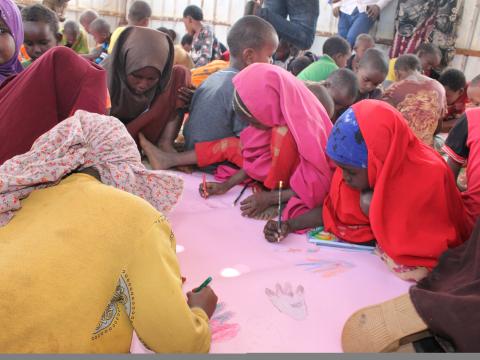Isaack and millions of children across Somalia have dreams…but who will bear the cost?

In Somalia, children face extreme vulnerability in the face of drought and conflict. The combination of these two, robs children of stability, education and access to vital services.
Children and their families are forced to abandon their homes in search of safety and humanitarian assistance. This often leads them to settle in settlements for the displaced, where they rely on limited resources and struggle to meet their basic needs.
Isaack, a 12-year-old boy, lives in a settlement camp, located in Baidoa, south central of Somalia, with his mother. They fled here to escape the adverse effects of drought and conflict, ravaging parts of the country.
Isaack spends the majority of his days at a nearby Child Friendly Space (CFS) centre. This centre provides him with various educational and recreational activities, such as arts, reading, numeracy, and interactive play with other children. He has made quite a number of friends here.

At least 240 children attend the CFS centre, spending up to four hours each day, from Saturday to Thursday, engaging in various activities. When at the centre, Isaack, particularly enjoys drawing, proudly displaying the flag of Somalia that he had drawn. It is evident, he has a deep affection for his country.
“I love coming here to learn. When I grow up, I would like to become a teacher so that I am able to teach other children,” he says. Unfortunately, there aren’t public schools in this location for children like Isaack to enroll, making the CFS centre the closest thing to education for children caught up in the cycle of disasters.
This particular CFS centre is sustained through funding from the German Federal Foreign Office (GFFO). The funding enables World Vision to continue operating the centre, through equipping these centres with learning and play materials, while also offering incentives to the teachers, guards, and cleaners responsible for the children's well-being.
Funding from GFFO enables World Vision to keep the CFS centres operational
There are only four of these centres in Baidoa, that are run by World Vision, according to Yahye Abdikadir Abdirahman, a World Vision Protection and Education officer in Baidoa. The funding from GFFO enables World Vision to equip the centre with learning and play materials, as well as provide incentives for the teachers who look after the children, guards and cleaners.
The impact of the CFS centre extends beyond a single settlement camp. Children from at least nine different settlement camps benefit from the four CFS centres that are operated by World Vision. Baidoa, hosts over 600 settlement camps, accommodating individuals and families who have been displaced due to drought and conflict.
Sahra Ali Abdi, an official from the Ministry of Home Affairs, sheds light on challenges faced by children like Isaack in accessing formal education and further achieving their full potential.
"The burden of these disasters cause significant disruption in family dynamics that affects the children’s stability. There is usually separation among couples, she notes, adding that conflicts arising from the inability by parents to meet their basic needs are mostly to blame for driving these separations.
She further emphasises that children residing in settlement camps face limited prospects for accessing formal education anyways. The scarcity of public schools combined with the high cost of private schools, places education beyond their reach and affordability.
Child friendly Space centres offer children impacted by conflict some sense of normalcy
But centres like the CFS offer children some form of normalcy. As parents leave their homes each morning to engage in livelihood activities so that they can put food on the table, they leave their children at these centres under the care of trained teachers, viewing them as safe havens for their well-being.
Whilst the CFS centres are providing a secure and nurturing environment for children caught in the repeated cycle of conflict and drought, address their immediate need for child care in the absence of formal schooling, the lack of widespread educational opportunities poses long-term challenges for children like Isaack, hindering them from exploring their full potential.
The large number of people on the move as they search for food, water and pasture has led to an increase in the number of children deprived of access to education. As a result, an estimated three million children were reported to have dropped out of school as of September of 2022. Moreover, it is estimated that half of the children living in settlement camps have no access to education.
Among children who have been displaced with their families since 2021, over 60% are not receiving an education, as highlighted in a 2022 report by OCHA.
But for now, the Child Friendly Spaces remain the only available option for children in emergencies. Aden Hassan Aden, manager for the CFS, finds himself deeply concerned about the potential closures of the centres due to insufficient funding and support.
“The thought that these centres could shut down due to lack of funding is constantly lurking in my mind, “he shares. Aden understands the devastating effects this would have on vulnerable children. They would be exposed to an increased risk of abuse and violence.”
"At the CFS, we keep the children engaged with a variety of physical and mind stimulating activities. They not only acquire essential numeracy and literacy skills but also have the opportunity to participate in playful activities with toys and interact with their peers,” Aden Hassan Aden explains.
“Through these experiences, we have witnessed remarkable potential and brilliance of these children, and for some who have been fortunate to transition to formal schools, have shown exceptional academic success.”
He expresses his gratitude towards the donors and supporters who demonstrate unwavering commitment to the continuity of these centres, recognising their vital contribution to the lives of vulnerable children.
Story by Javan Niyakire, communications manager